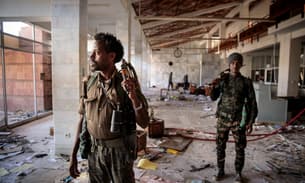
£2bn Meta court case over Ethiopian hate speech clears legal hurdle
A case against the tech giant over hate speech and ethnic violence revealed by TBIJ will go ahead in Kenyan courts
A £2bn legal case against Meta – the parent company of Facebook and Instagram – over fueling ethnic violence in Ethiopia can go ahead, a Kenyan court has ruled.
The petition, initially filed in December 2022, cites reporting from the Bureau of Investigative Journalism (TBIJ). In February that year, TBIJ and the Observer told the stories of Ethiopian civilians who said their family members were killed because of posts on Facebook.
On Thursday a judge ruled that Kenya’s legal system had the necessary jurisdiction to hear the case. The claimants are calling for two funds totalling £1.8bn to be set up, covering victims of both normal and sponsored Facebook posts that included hate speech.
The lead claimant in the case, Abrham Meareg Amare, says that his father, a professor at Bahir Dar University in Amhara, Ethiopia, was murdered after two Facebook posts targeted him as a member of the Tigrayan ethnic group. The posts included a photo of Professor Meareg Amare Abreha, details about where he lived and false claims that he was corrupt and helping the Tigrayan People’s Liberation Front, an armed group at war with the Ethiopian government at the time.
Professor Abreha was shot twice outside his home, once in the shoulder and once in the leg. For the next seven hours armed militants prevented his family from helping him and he died in the street.
His son spoke to TBIJ as part of the investigation into Facebook’s failure to deal with hate speech in Ethiopia. While he was not able to go on the record at the time, TBIJ introduced him to the lawyers who have supported the case.
The posts targeting Professor Abreha were just two of many that have spread hate and incited violence towards different ethnic groups in Ethiopia. The Tigray war, which began in 2020, killed hundreds of thousands, including many in ethnically motivated killings. The petition alleges that Meta repeatedly failed to take down posts calling for violence, including those promoting concentration camps and rape as a weapon of war.
The other claimant in the case is Fisseha Tekle, a researcher working for Amnesty International in Kenya who claims to have been targeted on Facebook over his work on Ethiopia. Amnesty and Global Witness are among the interested parties named in the petition.
The petition is also asking Meta to:
change its algorithms and moderation practices to stop the spread of viral hate speech;
take steps to demote incitements to violence on its platforms and;
hire enough content moderators to avoid further damage in East and Southern Africa.
The case is one of two major legal battles involving Meta in front of the Kenyan courts. A second claim brought by 185 content moderators who worked on Facebook content from the capital Nairobi was also given the go-ahead to be heard last year.
Meta has argued in both cases that the Kenyan courts have no jurisdiction and is expected to attempt to appeal the latest decision.
Meta did not respond to a request for comment.
In a statement, Meareg Amare said: “I am grateful for the court’s decision today. It is disgraceful that Meta would argue that they should not be subject to the rule of law in Kenya. African lives matter.
“Mark Zuckerberg may imagine that justice begins and ends at the US border. I am happy that the court has demonstrated today that is not the case.”
Lead image: Amnesty International researcher Fisseha Tekle, one of the claimants in the case. Credit: Foxglove
Reporter: Jasper Jackson
Deputy editor: Chrissie Giles
Editor: Franz Wild
Fact checker: Alex Hess
Production editor: Frankie Goodway
TBIJ has a number of funders, a full list of which can be found here. None of our funders have any influence over editorial decisions or output.
-
Area:
-
Subject:







